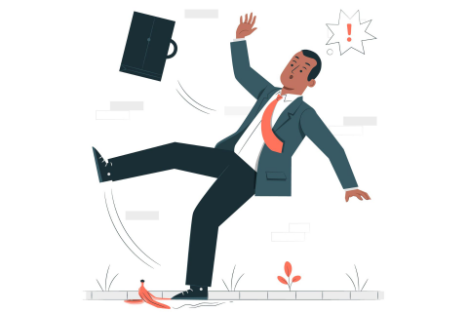When someone slips and falls, they can often be left with serious injuries. In some cases, the victim may be able to file a lawsuit against the party or parties responsible for their fall. In personal injury cases, the victim bears the burden of proof. So, it is the victim’s duty to prove the liability in a slip and fall accident. Therefore, it’s important to understand who is liable in a slip and fall accident to know who to contact if you are injured. This blog post will discuss the parties that may be held accountable.
What Kind of Slip and Fall Accidents are there?
There are two main types of slip and fall accidents: those that occur on public property and those that occur on private property. Suppose you slip and fall on public property, such as a sidewalk or in a park. In that case, you may be able to file a lawsuit against the government entity responsible for maintaining the property. If you slip and fall on private property, such as in a store or at someone’s home, you may be able to file a lawsuit against the owner of the property.
Homeowner Liability
Homeowners who invite people onto their property are legally responsible for ensuring that the premises are reasonably safe. This includes anyone they invited as well as anyone they expected would be on the property.
One example is that of a delivery person who might fall on the homeowner’s stairs when delivering a product. In this situation, the delivery person might be able to sue the homeowner with a slip and fall claim if the owner had not maintained their stairway in good condition. Though a home is reasonably safe, oftentimes, accidents can still occur. Homeowners simply need to take common safety measures to reduce the risk of injury.
Contractor Companies
A common type of slip and fall accident occurs when a contractor puts their equipment in the way of where people can walk, for example, on the footpaths. If trash and rubble are left on the footpaths, it becomes a hazard for those merely walking by–and the company responsible for the mess is often held accountable. If the defendant is the one who created a dangerous condition, they are legally obligated to either fix it or warn those who could be injured by it. If they fail to do so and you get hurt, the individual can sue the contractors and get paid for the injuries.
Corporate Liability
In many situations, corporates are liable for injuries on the job. For example, employees are entitled to sue a firm in a slip-and-fall accident if it occurs on the job. Some employees might get slip and fall injuries by performing dangerous tasks that are a part of their job. If you were hurt while working for a company, you might be able to hold your employer responsible for your injuries. Often, employers have different types of insurance to cover their employees’ injuries, especially in fields that are prone to accidents, like construction.
Conclusion:
As you can see, there are a variety of different parties that may be held liable for a slip and fall accident. If you have been injured in a slip and fall, it’s important to contact an experienced personal injury attorney who can help determine who is responsible for your injuries. They will also be able to help you recover the compensation you deserve.












